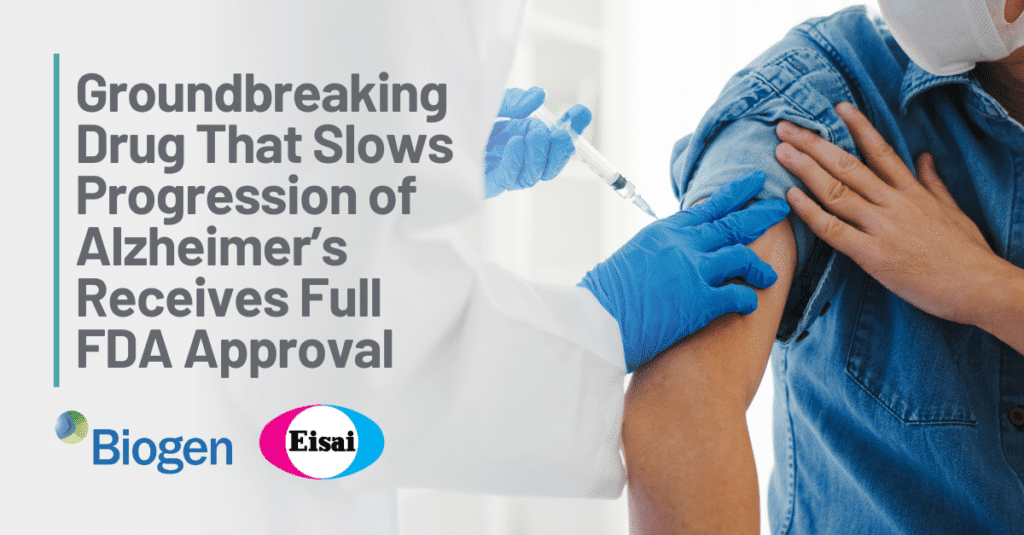Groundbreaking Drug That Slows Progression of Alzheimer’s Receives Full FDA Approval

The U.S. Food and Drug Administration (FDA) has, for the first time, fully approved a drug that slows the progression of Alzheimer’s disease.
The drug, lecanemab, will be marketed under the name Leqembi. It was developed by Biogen and Eisai, drug companies based in the U.S. and Japan, respectively, and, following its July 6 approval, will become available to people living with a diagnosis of mild cognitive impairment (MCI) or mild dementia due to Alzheimer’s disease (early-stage Alzheimer’s disease).
While persons diagnosed with FTD are not eligible for a Leqembi prescription, AFTD considers the drug’s approval a positive sign for FTD drug development. “Any FDA-approved treatment for dementia attracts more industry investment in dementia research generally — and possibly FTD research specifically,” said AFTD Medical Advisory Council Chair Bradford C. Dickerson, MD.
“While this drug will not be helpful as a treatment for FTD, the fact that full regulatory approval has been granted to a treatment that slows the progression of a neurodegenerative disease offers tremendous hope for future breakthroughs in FTD,” Dr. Dickerson continued.
Received Accelerated Approval in January
Leqembi was initially granted accelerated approval from the FDA in January based on evidence that the drug removes beta-amyloid, a biomarker for Alzheimer’s disease. In a phase 3 clinical trial, conducted on nearly 1,800 participants, disease progression slowed down by 27 percent in people with Alzheimer’s who were injected with the Leqembi, compared to a control group that received a placebo.
A 2012 federal law allows the FDA to grant “accelerated approval” based on surrogate endpoints for drugs that treat serious conditions where there is a significant unmet medical need. Surrogate endpoints, or biomarkers, are measurable signs of a disease that are believed to predict a drug’s impact on a person’s signs, symptoms, functioning, or survival, but are not direct measures of clinical functioning.
The use of surrogate endpoints means that a drug can be approved much faster than needing to wait for clear clinical benefit, such as a reduction in symptoms. After accelerated approval, drug companies are required to continue studying the drug through clinical trials, and if confirmatory trials do not demonstrate clinical benefit, the approval can be rescinded.
Last week, Leqembi was granted full FDA approval, based on further data suggesting clinical benefit.
“A Better Quality of Life” – But Possible Risks
Leqembi is not a cure for Alzheimer’s, but may allow people living with the disease to maintain activities of daily living for several months longer than they would otherwise be able. “In real-world terms, this likely means more time for the patient to be living independently, enjoying their hobbies, their friends and having a better quality of life,” Donna Wilcock, assistant dean of biomedicine at the University of Kentucky, told NBC News.
Leqembi usage does carry risk. The same phase 3 trial showed that nearly 13 percent of participants receiving Leqembi experienced brain swelling (compared to less than 2 percent of the control group), and 17 percent suffered brain bleeds (compared to 9 percent of the control group).
Three participant deaths were reported during the trial, although it is not clear whether Leqembi was directly responsible. Nevertheless, the FDA will require Leqembi to carry a “black box” label – its most serious warning label – stating, among other things, that “serious intracerebral hemorrhages, some of which have been fatal, have been observed.”
Comparing Leqembi with Adulhelm
In 2021, an Alzheimer’s drug called Aduhelm, also produced by Biogen and Eisai, was – controversially, due to questions around its efficacy, side effects, and cost – granted accelerated approval by the FDA. The required confirmatory trial to further explore Aduhelm’s potential clinical benefit began in June 2022; results are expected in 2026.
Both Leqembi and Aduhelm were developed by Biogen and Eisai and are monoclonal antibody treatments that reduce beta-amyloid deposits pathology. Both carry a risk of risk of side effects, including amyloid-related imaging abnormalities (ARIA) — brain swelling or brain bleeds — though some evidence suggests Leqembi may be safer. Leqembi, however, is slightly less expensive ($26,500 per year compared to Aduhelm’s $28,000).
While Medicare will only cover Aduhlem for people receiving it as part of a clinical trial, the Centers for Medicare & Medicaid Services has agreed to expand its coverage, so Leqembi is expected to be covered for most eligible Medicare recipients in the U.S.
By Category
Our Newsletters
Stay Informed
Sign up now and stay on top of the latest with our newsletter, event alerts, and more…
